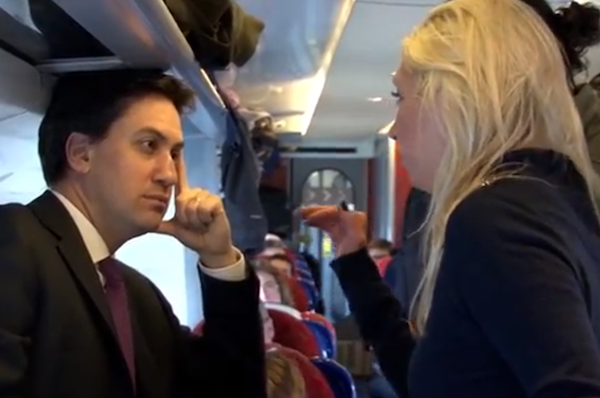Whether you like Ed Miliband’s latest party political broadcast depends very much on whether you’re the sort of person who openly weeps while listening to Coldplay. It’s got plenty of the Chris Martin playing Wembley factor: emotional piano music, people saying things like ‘please, give people some hope’, and the Labour leader leaning comfortingly against luggage racks, nodding knowingly. He talks about ‘a country that comes together, a country that joins together, a country that works together’, and even employs a ‘yes, we can!’ theme.
But what do we learn about what Labour is going to do to address this hunger for hope? Well, firstly that the Labour leader represents ‘the people who put in the hours, the people who do the shifts, the people who open their small businesses early in the morning, the people who work late at night’, for whom the country is currently ‘going backwards’. If Miliband were in the business of nicking slogans from Nick Clegg, he might call them ‘Alarm Clock Britain’. Perhaps this is an attempt to dismiss the ‘party of welfare’ tag that Tory spinners are so keen to hang around his neck. But then he explains what he thinks he can do for these people*:
– A recovery made by the many, not just by a few people at the top.
– Retaining the 50p rate of tax, using the money instead to protect tax credits.
– A mansion tax to fund the 10p tax rate.
– Free maternity leave for everyone getting a puppy.
– A living wage for Bristol! (And presumably everywhere else, although the crowd in Corn Street seem, unsurprisingly, very pleased with the idea of raising their pay, regardless of whether employers can afford to do it without cutting staff.)
– More houses in Bristol (the crowd says ‘yes!’ again to this idea.)
– Putting Britain’s young people back to work again.
– Taking on the ‘energy company rip-offs’ and breaking the stranglehold of the big six energy suppliers.
– Hope.
*There’s one idea in this list that the Labour leader didn’t mention in his PPB and may or may not instead have come from a fictional ‘policy jamming’ session, but Miliband was getting so worked up in this video and in his WATO interview that he could well have made this pledge too.
Now, some of these ideas are ones that Tories might also endorse: breaking the stranglehold of the big six energy suppliers sounds suspiciously like an acknowledgement that the problem with this utility is a lack of competition, not a need for re-nationalisation, which would be yet another stranglehold, albeit a state-sponsored one. And in spite of some of the strange things they come out with, most politicians are decidedly pro-hope and pro-putting young people into work.
But the problem is that by trying to ape some of the hopey-changey Obama 2008 vibe, Miliband doesn’t really address any of the big economic question marks that voters see hovering over his party. This is a very Bob Shrum-style people vs the powerful narrative, even managing to suggest that there are millionaires, and then there are people who get up early and go to bed late, as though one may not lead to the other. As James says, it’s all very well talking about tax cuts if you’re the sort who believes these things pay for themselves, but Miliband likes to mock Tory backbenchers when they bang on about this sort of thing. His plan for tax breaks for employers who pay a living wage doesn’t sound like the worst idea: paying people enough to live on is a good thing. This broadcast is very much sitting on the edge of the ‘repository for people’s anger’ that Tony Blair warned about. It’s why rumours are sweeping Westminster that those who don’t make voters think of the last Labour administration might get promotions, such as Rachel Reeves.
Meanwhile the Tories really are getting quite excited about the idea of Labour tying itself in knots when the party does want to talk about the serious things like those scary post-Budget graphs. You can understand why it’s easier to rip off Coldplay and tell voters what they want to hear, but the polls suggest that it’s not what voters need to hear for them to put a cross next to your name on the ballot paper.







Comments